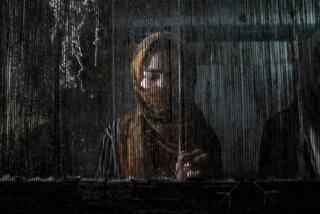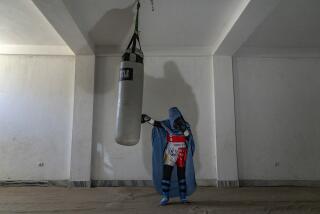Behind bars for seeking freedom
- Share via
Arzou doesn’t believe she has committed any crime other than trying to win her own freedom.
Married at 17 to an older man she did not love, she considered herself little more than a household slave. She was afraid not only of her husband, but also her four brothers-in-law. The only bright spot in her life was her son, Sadiq, now 2 -- her companion behind bars.
Arzou ran away from her husband, returning to her father’s house. But he had remarried since her departure, and her stepmother did not take well to an interloper. She ran away again.
Her stepmother went to the police. Arzou was charged at first with “home escape,” which is no longer supposed to be a crime in Afghanistan. So she found herself facing the accusation of sexual misconduct, which can be applied to almost any woman outside the supervision of a husband or father.
Most of the women imprisoned in Afghanistan are charged with zina, or engaging in extramarital sex, which can be used to punish any “offense,” including attempted elopement or being alone with a man who is not a relative. Rape victims are sometimes given the choice of serving time for zina or marrying their rapist.
Arzou has served eight months of her two-year sentence. In an unlikely way, prison has become the home she never had.
Jail conditions have vastly improved since the construction of the new women’s prison in Kabul, the capital; before, women were held in squalid conditions in a separate section of the notorious main jail at Pul-i-Charki. At the new prison, American correctional officers are mentoring their Afghan counterparts. There are literacy courses and vocational training classes.
Like Arzou, many of the women also have their children with them at the prison. Children are allowed to stay with their mothers until they turn 7, an age of wrenching partings if the mother has a long sentence. Arzou hopes to avoid that fate.
“He is my joy,” she said of Sadiq. “My only joy.”
-- Laura King
More to Read
Sign up for Essential California
The most important California stories and recommendations in your inbox every morning.
You may occasionally receive promotional content from the Los Angeles Times.













